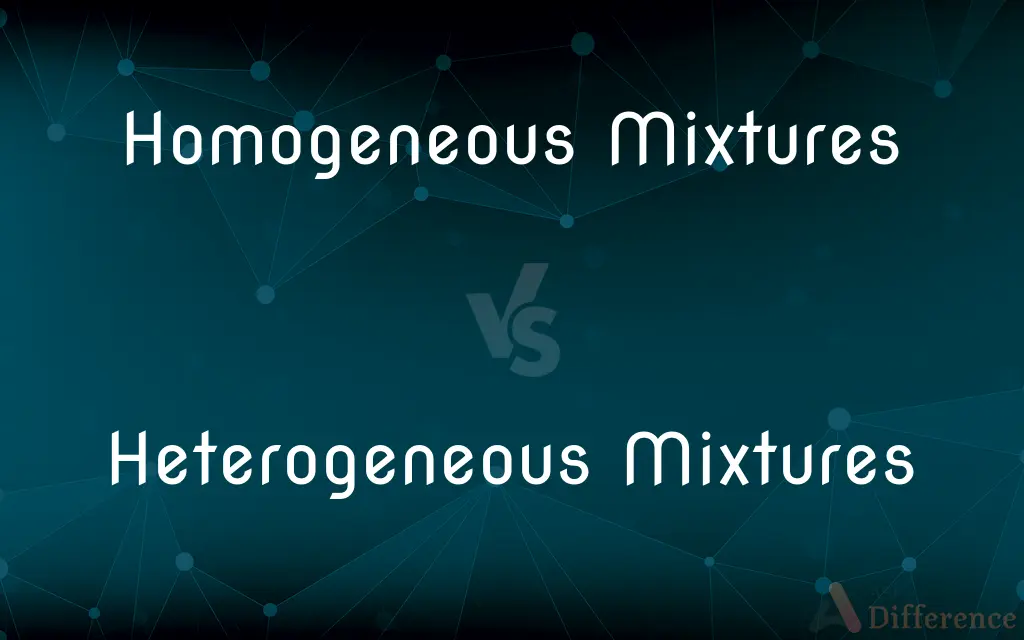Homogeneous Mixtures vs. Heterogeneous Mixtures — What's the Difference?
By Tayyaba Rehman — Published on October 2, 2023
Homogeneous Mixtures have uniformly distributed components, appearing as one phase, like salt in water. Heterogeneous Mixtures have visibly different components, appearing as multiple phases, like oil and water.

Difference Between Homogeneous Mixtures and Heterogeneous Mixtures
Table of Contents
ADVERTISEMENT
Key Differences
Homogeneous Mixtures and Heterogeneous Mixtures represent two different states of matter composition in chemistry. Homogeneous Mixtures have components that are uniformly distributed throughout the mixture, resulting in a single-phase appearance with no visible separation between different components. In contrast, Heterogeneous Mixtures consist of components that remain distinctly separated, showing multiple phases with clear boundaries.
In a Homogeneous Mixture, it is impossible to distinguish between the different components with the naked eye due to the uniform distribution of particles. Examples include air and dissolved salt in water. Heterogeneous Mixtures, on the other hand, exhibit non-uniform distribution, allowing for the easy identification of different substances within the mixture, such as in a salad or a sand and water mixture.
Homogeneous Mixtures are defined by their consistency and uniform composition, which is achieved on a molecular level, ensuring that each sample of the mixture is identical to any other sample of the same mixture. Heterogeneous Mixtures do not share this level of uniformity, and as such, different samples of the same mixture can have varying compositions, depending on which components are included in the sample.
The uniformity in Homogeneous Mixtures results from the thorough intermingling of particles on a molecular or ionic scale, often influenced by factors like temperature and solubility. Conversely, the lack of uniformity in Heterogeneous Mixtures can be attributed to the absence of sufficient intermingling due to differences in properties like size, phase, or polarity between the components.
Studying the behaviors of Homogeneous Mixtures and Heterogeneous Mixtures allows chemists to understand material properties and reactions and to develop methods to separate, manipulate, and use different substances. The clarity or obscurity in phase distinction between components in these mixtures serves as a key identifier for categorizing them appropriately.
ADVERTISEMENT
Comparison Chart
Phase Appearance
Single-phase appearance
Multiple phases with clear boundaries
Component Distribution
Uniformly distributed components
Non-uniform distribution of components
Visibility of Components
Components are not visibly distinguishable
Components are visibly distinguishable
Sample Uniformity
Every sample of the mixture is identical
Different samples can have varying compositions
Example
Salt dissolved in water
Oil and water mixture
Compare with Definitions
Homogeneous Mixtures
Appear as a single phase with no visible separation.
Dissolved sugar in water forms a Homogeneous Mixture.
Heterogeneous Mixtures
Have visibly different, non-uniformly distributed components.
A salad is a Heterogeneous Mixture of different vegetables.
Homogeneous Mixtures
Components are indistinguishable to the naked eye.
In a Homogeneous Mixture of alcohol and water, you can't distinguish the two components.
Heterogeneous Mixtures
Lack uniformity due to insufficient intermingling of components.
A pizza is a Heterogeneous Mixture due to the lack of uniformity between its toppings and base.
Homogeneous Mixtures
Every sample of the mixture is identical.
Any sample taken from a Homogeneous Mixture of vinegar and water will have the same composition.
Heterogeneous Mixtures
Exhibit multiple phases with clear boundaries.
An oil and water mixture is a Heterogeneous Mixture with two distinct layers.
Homogeneous Mixtures
Have uniformly distributed components.
Air is a Homogeneous Mixture of various gases.
Heterogeneous Mixtures
Different samples can have varying compositions.
Different samples from a Heterogeneous Mixture of sand and water may contain varying amounts of sand.
Homogeneous Mixtures
Exhibit uniform composition on a molecular or ionic scale.
A solution of salt and water is a Homogeneous Mixture with uniform composition.
Heterogeneous Mixtures
Components are distinguishable to the naked eye.
In a Heterogeneous Mixture of fruit and cereal, the individual components are easily identifiable.
Common Curiosities
Can you easily identify the different components in Heterogeneous Mixtures?
Yes, in Heterogeneous Mixtures, the components are visibly distinguishable.
Are the components in Homogeneous Mixtures visible to the naked eye?
No, in Homogeneous Mixtures, the components are not visibly distinguishable.
What’s an example of a Heterogeneous Mixture?
A salad, with its visibly different components like lettuce and tomatoes, is a Heterogeneous Mixture.
Are all samples from a Heterogeneous Mixture identical?
No, different samples from a Heterogeneous Mixture can have varying compositions.
Can you give an example of a Homogeneous Mixture?
Air is an example of a Homogeneous Mixture, with various gases uniformly mixed.
Can the components in Heterogeneous Mixtures be in different states of matter?
Yes, Heterogeneous Mixtures can have components in different states of matter with visible boundaries, like ice cubes in a liquid.
How can Homogeneous Mixtures be separated?
Homogeneous Mixtures can be separated using methods like distillation or chromatography based on the differences in the properties of the components.
What is a key characteristic of Homogeneous Mixtures?
Homogeneous Mixtures have uniformly distributed components and appear as a single phase.
Can the uniformity in Homogeneous Mixtures be influenced by temperature?
Yes, factors like temperature can influence the uniformity and solubility in Homogeneous Mixtures.
Why do Homogeneous Mixtures appear as a single phase?
The uniform distribution of components on a molecular or ionic scale makes Homogeneous Mixtures appear as a single phase.
Are the components in Homogeneous Mixtures always in the same state of matter?
No, the components in Homogeneous Mixtures can be in different states of matter but are uniformly distributed at the molecular or ionic level.
Why do Heterogeneous Mixtures have clear boundaries between components?
The lack of sufficient intermingling due to differences in properties like size, phase, or polarity creates clear boundaries in Heterogeneous Mixtures.
Can Heterogeneous Mixtures be easily separated?
Many Heterogeneous Mixtures can be separated more easily, often by mechanical means, due to the visible distinctions between their components.
Share Your Discovery

Previous Comparison
White Vinegar vs. Distilled Vinegar
Next Comparison
Lycan vs. WerewolfAuthor Spotlight
Written by
Tayyaba RehmanTayyaba Rehman is a distinguished writer, currently serving as a primary contributor to askdifference.com. As a researcher in semantics and etymology, Tayyaba's passion for the complexity of languages and their distinctions has found a perfect home on the platform. Tayyaba delves into the intricacies of language, distinguishing between commonly confused words and phrases, thereby providing clarity for readers worldwide.
















































